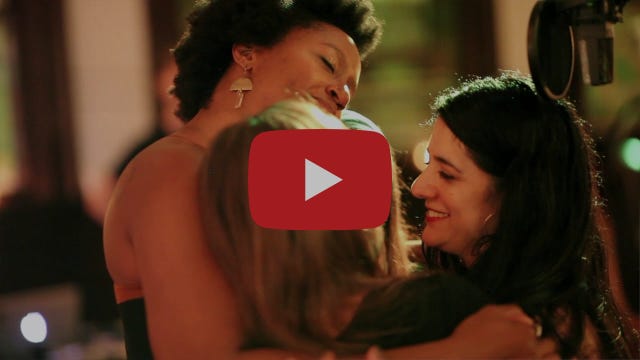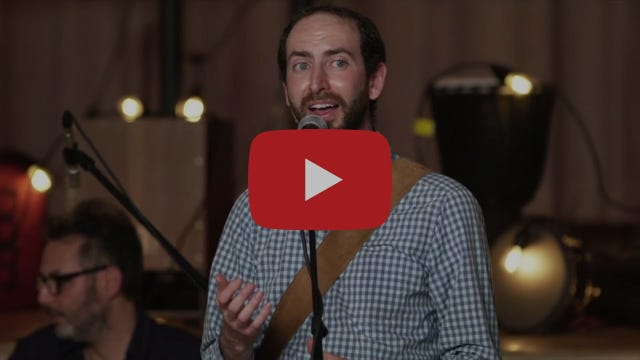Ki Tisa 5783: The Mirror 👓
Ki Tisa 5783

Anim Zemirot
Rabbi Josh Warshawsky and the Chaverai Nevarech Band
Featuring Rabbi Deborah Sacks Mintz
The Mirror.
Every day, the words we read and pray in the siddur remain the same, but the person who arrives at that moment of prayer is different, bringing with them new experiences, memories, and emotions. So sometimes, if we continue to come back to them, new insights, inspirations, and meanings can strike when we least expect them to! I love finding a new way to read or think about a prayer I’ve been saying my entire life.
Lately I’ve been rethinking the Mi Chamocha prayer. So iconic! The Song of the Sea! We sing it twice a day: “Who is like You, God?!” I’ve recently decided to read these words as a rhetorical question, directed back at the pray-er, as if they were saying it in the mirror, “Who is like You, God? I’m supposed to be like you! I’m made in your image!” And the preceding paragraph gives us the answer of what it actually means to be like God. Right before Mi Chamocha, we describe God in the following way:
רָם וְנִשָּׂא גָּדוֹל וְנוֹרָא מַשְׁפִּיל גֵּאִים וּמַגְבִּֽיהַּ שְׁפָלִים מוֹצִיא אֲסִירִים וּפוֹדֶה עֲנָוִים וְעוֹזֵר דַּלִּים וְעוֹנֶה לְעַמּוֹ בְּעֵת שַׁוְּעָם אֵלָיו
God is exalted and uplifted, great and awesome: God humbles the prideful and raises the humble. God frees the captive and redeems those in need, helps the impoverished, and answers God’s people when they cry out. (Morning Liturgy)
What it means to be like God is to do these things that we say God does! The moment we first recited this prayer was the first moment we sung out as a free people as we crossed the Red Sea. Now that we are free, it comes with an immense amount of responsibility and care and concern for those around us. It’s as if the prayer is asking us how we can expect God to help us and help others if we don’t do the same?
In this week’s parsha, Ki Tisa, Moses asks to behold God’s presence. God responds that no one can see God’s presence and live, but that God will:
אַעֲבִיר כּל־טוּבִי עַל־פָּנֶיךָ וְקָרָאתִי בְשֵׁם ה׳ לְפָנֶיךָ וְחַנֹּתִי אֶת־אֲשֶׁר אָחֹן וְרִחַמְתִּי אֶת־אֲשֶׁר אֲרַחֵם׃
I will make all My goodness pass before you, and I will proclaim before you the name YHVH, and I will grant the grace that I grant and show the compassion that I show (Ex. 33:19)
The Chasidic Rabbis explain that what God is saying to Moses is that God responds to humans measure for measure - showing grace and compassion to those who show grace and compassion. That’s our mission and what it means to be free - to show grace and compassion, lift up those who are in need, and answer the call of those who cry out.
The rabbis in the Talmud have another interpretation of this verse, and they explain that when God passes by Moses, God shows him the knot on the back of God’s tefillin (BT Brachot 6a). And what is written in God’s tefillin? ״וּמִי כְּעַמְּךָ יִשְׂרָאֵל גּוֹי אֶחָד בָּאָרֶץ״, “Who is like Your people, Israel, singular in the land?” (Chronicles 17:21) - The reciprocal of Mi Chamocha! God and the people of Israel are mirror images of each other, ideally each reflecting back each others’ best qualities.
In this prayer, Anim Zemirot, we longingly and lovingly sing out to God, yearning to be close to our soul’s partner. Later in the song, the author writes:
קֶשֶׁר תְּפִלִּין הֶרְאָה לֶעָנָו תְּמוּנַת ה' לְנֶגֶד עֵינָיו. רוֹצֶה בְּעַמּוֹ עֲנָוִים יְפָאֵר
God showed the knot of God’s tefillin to God’s humble servant (Moses)...God desires God’s people, God will glorify the humble.
Moses is humble so God glorifies the humble and honors his request. The more goodness and grace and compassion and deep listening we put into the world, the more those qualities reverberate out and come back to us as well. May we always strive to answer the question “Who is like You, God?” by embodying the image of God and Godliness in the world.
Shabbat Shalom,
Josh

Did you miss our new release?
Ein Kamocha
Rabbi Josh Warshawsky
Join us this year for an exploration of the weekly Torah portion and the story of the Jewish people in connection and conversation with my musical compositions. Through this journey, I hope we find deeper meaning in these melodies, stronger ties to our tradition, and true relevance to the work we are doing in the world today. I’m not exactly sure where this journey will lead, though I hope it will lead to new conversations, new ideas, new relationships, new inspiration, and new music. I’d love to hear your thoughts along the way.


